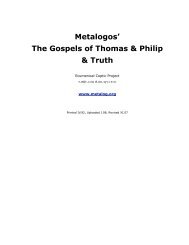Andrew Louth - Syriac Christian Church
Andrew Louth - Syriac Christian Church
Andrew Louth - Syriac Christian Church
You also want an ePaper? Increase the reach of your titles
YUMPU automatically turns print PDFs into web optimized ePapers that Google loves.
LIFE AND TIMES 13<br />
into the Imperial <strong>Church</strong> in 630, and there seems to have been some<br />
success in Syria and Mesopotamia. But the greatest success for<br />
Monenergism was achieved in Egypt. In the autumn of 631 Cyrus,<br />
Metropolitan of Phasis (and thus called ‘the Caucasian’, al-Muqauqas<br />
in Arabic), the early recruit to Monenergism, was appointed<br />
Chalcedonian Patriarch of Alexandria and Augustal Prefect of Egypt<br />
with the task of achieving religious unity on the basis of Imperial<br />
orthodoxy, i.e. Monenergism. He seems to have had some success with<br />
the Monophysites, with Monenergism being regarded as capitulation<br />
on the part of the Chalcedonians: the Byzantine chronicler,<br />
Theophanes, reports that the Monophysites boasted that ‘it is not we<br />
who are accommodating to Chalcedon, rather Chalcedon is coming to<br />
us!’ 20 In true Byzantine fashion (and following Heraclius’ example in<br />
Syria and Mesopotamia), theological compromise was backed up by<br />
persecution, and it is as a persecutor that Cyrus is remembered in<br />
Coptic sources. In 633 Cyrus presided at a solemn Eucharist held in<br />
Alexandria at which many of the ‘Theodosian’ (the Egyptian<br />
equivalent of ‘Jacobite’) clergy were reconciled and the doctrinal<br />
agreement achieved solemnly read from the ambo by the Patriarch.<br />
This agreement, in nine chapters, survives, as it was cited at the sixth<br />
Ecumenical Council in 680/1: it is a classic and carefully-phrased<br />
statement of Monenergism, affirming the Cyrilline formula of ‘one<br />
Incarnate nature of God the Word’, theopaschism, and the assertion of<br />
a single ‘theandric activity’ in Christ, on the authority of Denys the<br />
Areopagite.<br />
Up until 633 there seems to have been no opposition from any of<br />
those who accepted Chalcedon to the doctrine of Monenergism. But in<br />
633, as Cyrus was celebrating his successful reconciliation of the<br />
Egyptian Monophysites, the aged monk Sophronius was in Alexandria.<br />
He read Cyrus’ Nine Chapters and protested that they were heretical.<br />
Unable to prevent Cyrus from going ahead, Sophronius travelled to<br />
the imperial capital and made his protest to the Patriarch. Sergius<br />
respected the authority of the old monk and issued an ‘authoritative<br />
statement’, a Psephos, in which he forbade any language of ‘one’ or<br />
‘two’ activities in Christ, and spoke simply of one Divine subject in<br />
Christ, which excludes there being two wills in Christ contrary to each<br />
other. The union in Alexandria was potentially of far-reaching<br />
importance, something that Sergius felt needed to be communicated to<br />
his brother-bishop in Rome, Pope Honorius. He had to report,<br />
however, that the terms of that union had provoked a protest from<br />
Sophronius, who had now left Constantinople and gone to his original<br />
homeland of Palestine, where he had been elected Patriarch of<br />
Jerusalem. In his letter to the Pope, Sergius stresses the immense<br />
significance of the union achieved in Alexandria, and expresses the




